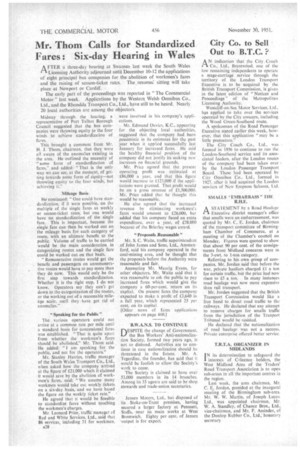Mr. Thom Calls for Standardized Fares : Six-day Hearing in Wales
Page 30

If you've noticed an error in this article please click here to report it so we can fix it.
AFTER a three-day hearing at Swansea last week the South Wales Licensing Authority adjourned until December 10-12 the applications of eight principal bus companies for the abolition of workmen's fares and the raising of season-ticket rates. The resumed sitting will take• place at Newport or Cardiff.
The early part of the proceedings was reported in "The Commercial Motor" last week. Applications by the Western Welsh Omnibus Co.. Ltd., and the Rhondda Transport Co., Ltd., have still to be heard. Nearly 20 local authorities are among the Objectors.
Midway through the hearing, a representative of Port Talbot Borough Council suggested that the bus companies were throwing equity to the four winds to achieve standardization of fares.
This brought a comment from Mr. H. J. Thom. chairman, that they were all aware of the anomalies existing in the area. He outlined the necessity of " some form of standardization of fares." and added: "That is the only way we can see, at the moment, of getting towards some form of equity—not throwing equity to the four winds, hut achieving it."
Mileage Basis He continued: "One could have standardization. if it were possible, on the multiple of the single fares as weekly or season-ticket rates, but one would have no standardization of the single fare. This is important, because the single fare can then he worked out on the mileage basis for each category of route, with an ultimate benefit to the public. Volume of traffic to be carried would be the main consideration in categorizing routes and the single fare could be worked out on that basis.
"Remunerative routes would get the benefit and passengers on unremuneralive routes would have to pay more than they do now. This would only be the first step towards standardization. Whether it is the right step, 1 do not know. Operators say they can't get down to the categorization of the routes, or the working out of a reasonable mileage scale, until they have got rid of anomalies."
"Speaking for the Public" The various operators could not arrive at a common rate per mile until a standard basis for concessional fares was established. "That is quite apart from whether the workmen's fares should be abolished," Mr. Thom said. He added: "I am speaking for the public, and not for the operator's."
Mr. Stanley Harries, traffic manager of the South Wales Transport Cu., Ltd., when asked how the company arrived at the figure of £21,000 which it claimed it would save by the abolition of workmen's fares, said: "We assume many workmen would take out weekly tickets on a six-day basis, and we have based the figure on the weekly ticket rate." He agreed that it would be feasible to standardize fares without touching the workmen's charges. • Mr. Leonard Price, traffic manager of Red and White Services, Ltd., said that 136 services, including 31 for workmen.
A28 were involved in his company's applications.
Mr. Edmund Davies, IC.C., appearing for the objecting local authorities, suggested that the company had, been pessimistic in its estimate's for the past year when it applied successfully last January for increased fares. He said the healthy financial position of the company did not justify its seeking new increases on financial grounds.
Mr. Price agreed that the present operating profit was estimated at £136,000 a year, and that this figure: would increase to 1:123,000 if the applications were granted. That profit would be on a gross revenue of £1,500,000. Mr. Price added that he thought this would be reasonable.
He also agreed that the increased revenue by eliminating workmen's fares would amount to £26,000, but added that his company faced an extra expenditure, over a year, of £78,000 because of the Brierley wages award.
"Proposals .Reasonable" Mr. S. C. Waite, traffic superintendent of John James and Sons, Ltd., Ammanford, said his company operated in the coal-mining area, and he thought that the proposals before the Authority were reasonable and fair.
Answering Mr. Meurig Eyans, for other objectors, Mr. Waite said that it was reasonable to ask the public to pay increased fares which would give the company a 60-per-cent. return on its capital. On present fares the company expected to make a profit of 0,640 in a full year, which represented 25 per cent, on its capital.
[Other news of fares applications appears on page 4641] B.W.A.N.S. TO CONTINUE
DESPITE the change of Government, the Bus Workers' Anti-nationalization Society, formed two years ago, is not to disband. Activities are to continue in case nationalization should be threatened in the future. Mr. A. Tegerdine, the founder, has said that it would be foolish to allow the Society's work to cease.
The Society is claimed to have over 53,000 members in its 14 branches. Among its 33 agents are said to be shop stewards and trade-union secretaries.
Jensen Motors, Ltd., has disposed of its Stoke-on-Trent premises, having secured a larger factory at Pensnett, Staffs, near its main works at West Bromwich. Eighty per cent. of Jensen 'output is for export.




















































































